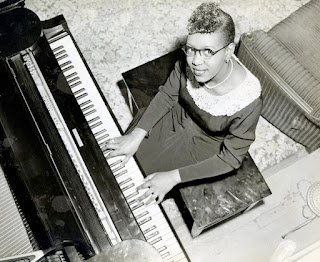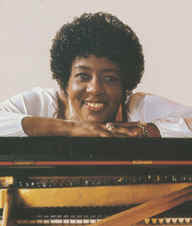 A fine soul-jazz organist of the 1960s, Trudy Pitts has been relatively overlooked in comparison to the small crowd of other Philadelphians from the period who made their mark with the Hammond B-3 organ. Although she favoured a slightly more pop-oriented sound than most of her peers, with a romantic loungish air on some of her recordings, she could also burn through uptempo tunes, occasionally adding some dinner-clubbish singing of her own.
A fine soul-jazz organist of the 1960s, Trudy Pitts has been relatively overlooked in comparison to the small crowd of other Philadelphians from the period who made their mark with the Hammond B-3 organ. Although she favoured a slightly more pop-oriented sound than most of her peers, with a romantic loungish air on some of her recordings, she could also burn through uptempo tunes, occasionally adding some dinner-clubbish singing of her own.Trudy is a native Philadelphian who began playing piano at age six. Her mother, too, was a musician and inspired this family tradition.
Trained as a musician and a music educator, Pitts studied at the Philadelphia Musical Academy, Temple University and Juilliard. She achieved a degree in music from the Connecticut College for Women. She was doing some club singing and teaching when she was approached by drummer Bill Carney in 1955 to fill the organ chair in his group, which had previously been occupied by Shirley Scott; Tootie Heath and John Coltrane were also in Carney's combo. Early work experience included a position as an assistant to the pianist in the Tony Award-winning musical Raisin.
Trained as a musician and a music educator, Pitts studied at the Philadelphia Musical Academy, Temple University and Juilliard. She achieved a degree in music from the Connecticut College for Women. She was doing some club singing and teaching when she was approached by drummer Bill Carney in 1955 to fill the organ chair in his group, which had previously been occupied by Shirley Scott; Tootie Heath and John Coltrane were also in Carney's combo. Early work experience included a position as an assistant to the pianist in the Tony Award-winning musical Raisin.
Pitts had not yet played often in the jazz style, and although the job went to someone else, Carney encouraged Pitts' progress on jazz organ by helping her get work. By 1958 she was playing in Carney's group the Hi-Tones and married to Carney; the group assumed the billing of Trudy Pitts & Mr. C. Pitts developed a style that was somewhat less blues-based than other Hammond organists, partly as a result of her classical training and also from using her foot to play bass instead of depending on her left hand.
 Pitts recorded a few albums for Prestige in the late '60s, the first few of these featuring Pat Martino on guitar, with Carney still filling the drum seat. Although some of the tracks on these were overt pop covers such as Herb Alpert's "The Spanish Flea,""Matchmaker, Matchmaker" (from Fiddler on the Roof), and "A Whiter Shade of Pale," these were actually interpreted with imaginative taste and a pretty solid soul-jazz groove. Carney and Pitts also wrote some original material in a more straight-ahead jazz vein, and she proved herself able to swing with the best of them with fluid and passionate runs on cuts like her version of "Take Five."
Pitts recorded a few albums for Prestige in the late '60s, the first few of these featuring Pat Martino on guitar, with Carney still filling the drum seat. Although some of the tracks on these were overt pop covers such as Herb Alpert's "The Spanish Flea,""Matchmaker, Matchmaker" (from Fiddler on the Roof), and "A Whiter Shade of Pale," these were actually interpreted with imaginative taste and a pretty solid soul-jazz groove. Carney and Pitts also wrote some original material in a more straight-ahead jazz vein, and she proved herself able to swing with the best of them with fluid and passionate runs on cuts like her version of "Take Five."In 1967, she released her debut album “Introducing the Fabulous Trudy Pitts.” Allmusic awarded the album 3 stars stating "A strong debut from Trudy Pitts, divided between covers of pretty mainstream standards and gutsier straight soul-jazz. The Boston Globe printed a piece calling her a rising star and complimented her drawbar variation, vibrato shadings, and bass pedal work.
 Pitts and Carney stopped touring in the early '70s as their family grew, but she eventually went on to play with Ben Webster, Gene Ammons, and Sonny Stitt. She recorded four albums for Prestige Records, appearing with Willis Jackson among others. One of Pitts' most distinguished performances, on piano, is with Rahsaan Roland Kirk on the 1976 album Other Folk's Music. It includes her flowing composition "Anysha," named for her daughter and scored for cello, harp, flute, and other instruments.
Pitts and Carney stopped touring in the early '70s as their family grew, but she eventually went on to play with Ben Webster, Gene Ammons, and Sonny Stitt. She recorded four albums for Prestige Records, appearing with Willis Jackson among others. One of Pitts' most distinguished performances, on piano, is with Rahsaan Roland Kirk on the 1976 album Other Folk's Music. It includes her flowing composition "Anysha," named for her daughter and scored for cello, harp, flute, and other instruments.Pitts stayed active on organ and piano, and became a mentor figure in Philadelphia and an adjunct associate professor at the city’s University of the Arts, where she began teaching in 1991. In her later years Pitts played keyboard for the theatre and restaurants, but mostly the piano rather than the organ.
Recent festival appearances include the 11th Annual Mary Lou Williams Women in Jazz Festival at the Kennedy Centre in Washington, D.C., in May 2006. On September 15, 2006, Pitts was the first jazz artist play a concert on Philadelphia's Kimmel Center's 7,000 pipe organ, "taking the medium to a whole new level".
In 2008, she again performed on an exceptional organ, this time the Kennedy Centre’s Filene Organ. Trudy Pitts died at Chestnut Hill Hospital on December 19, 2010, aged 78, from pancreatic cancer.
Recent festival appearances include the 11th Annual Mary Lou Williams Women in Jazz Festival at the Kennedy Centre in Washington, D.C., in May 2006. On September 15, 2006, Pitts was the first jazz artist play a concert on Philadelphia's Kimmel Center's 7,000 pipe organ, "taking the medium to a whole new level".
In 2008, she again performed on an exceptional organ, this time the Kennedy Centre’s Filene Organ. Trudy Pitts died at Chestnut Hill Hospital on December 19, 2010, aged 78, from pancreatic cancer.
(Edited from Wikipedia & AllMusic)





